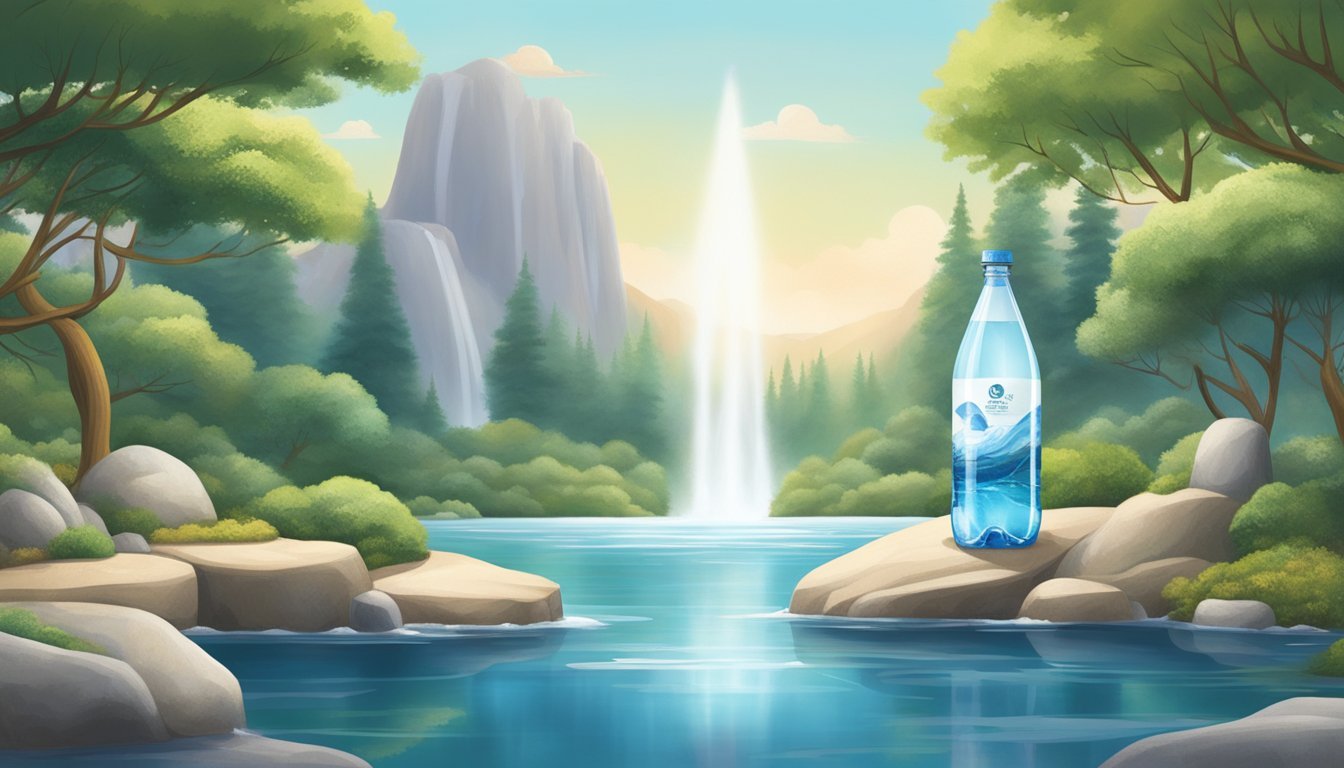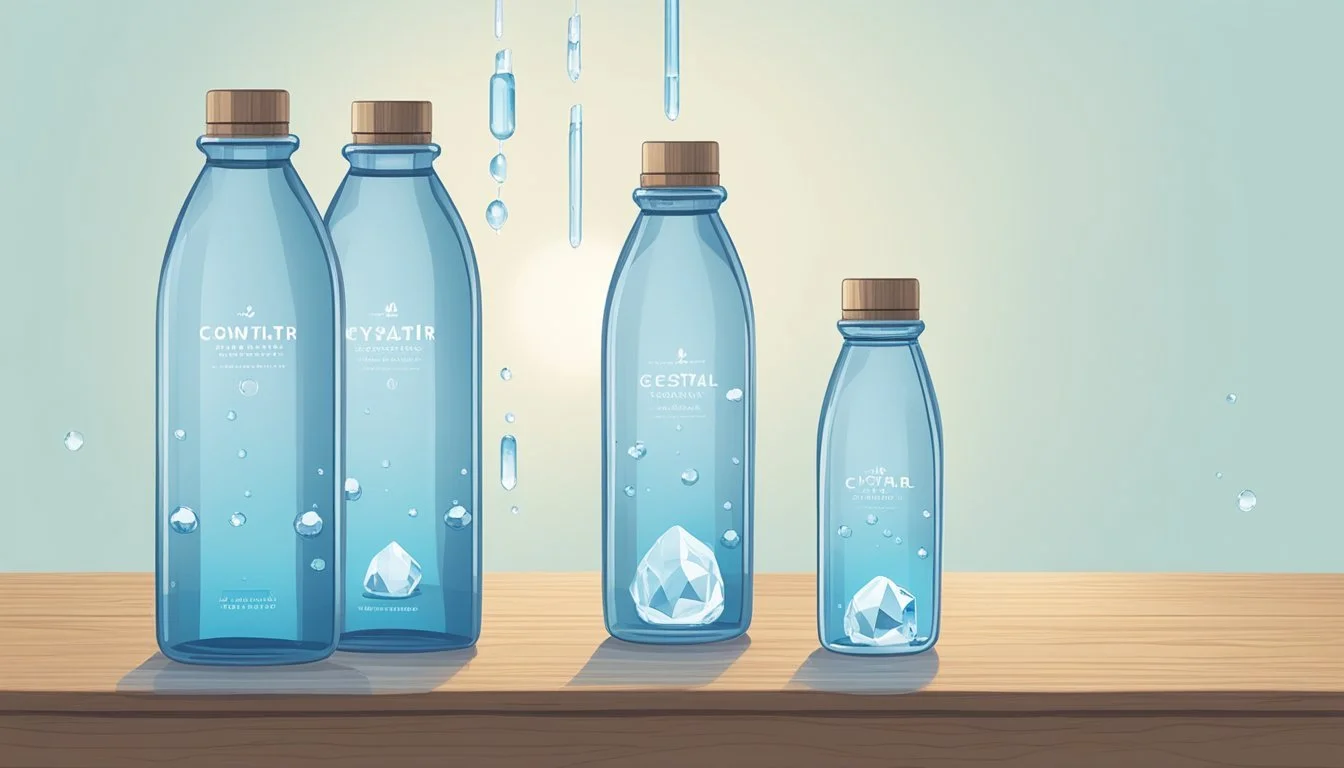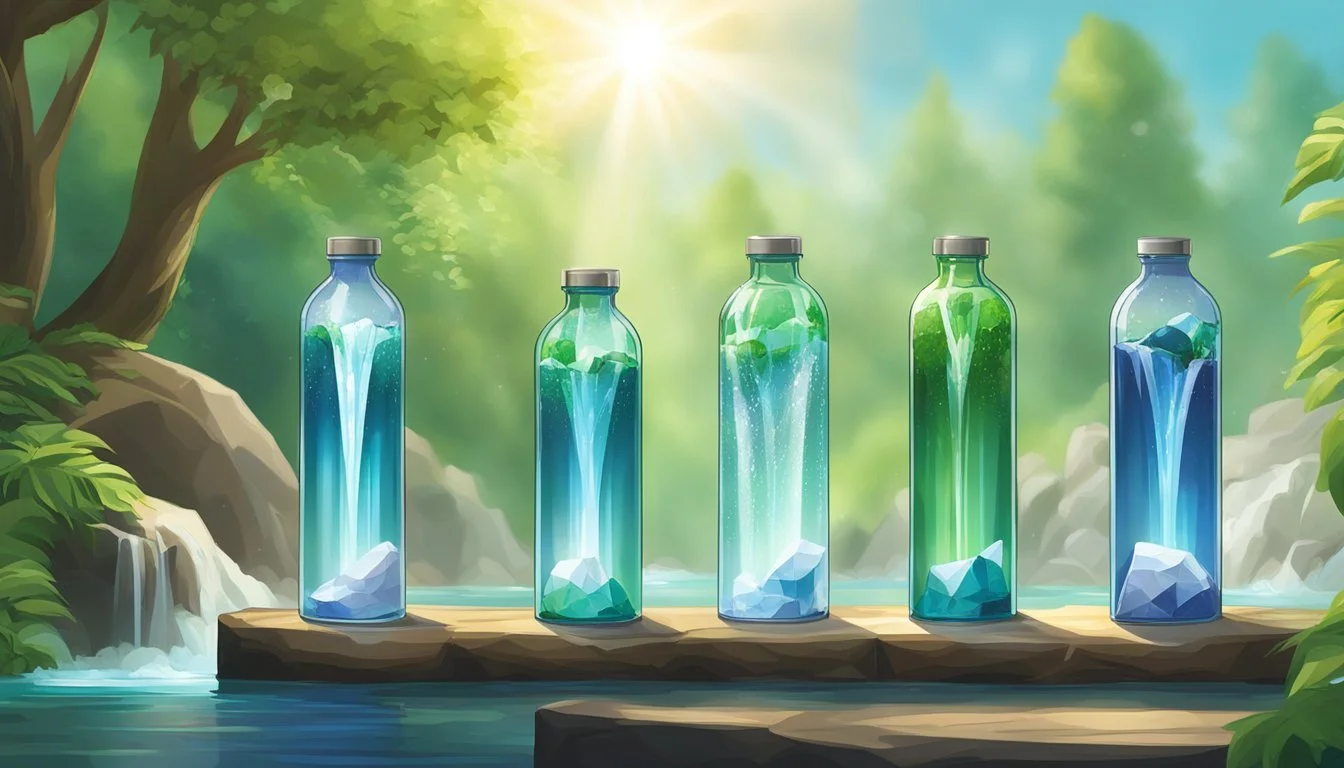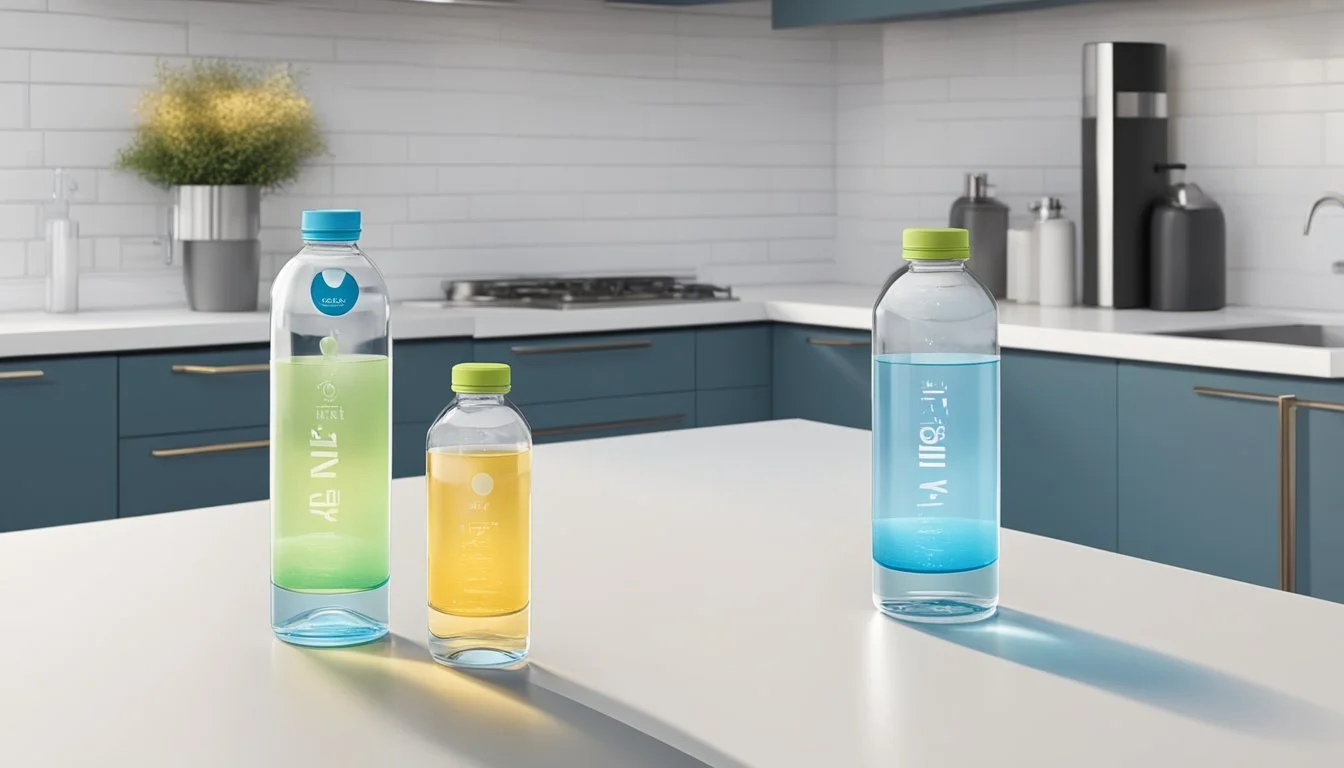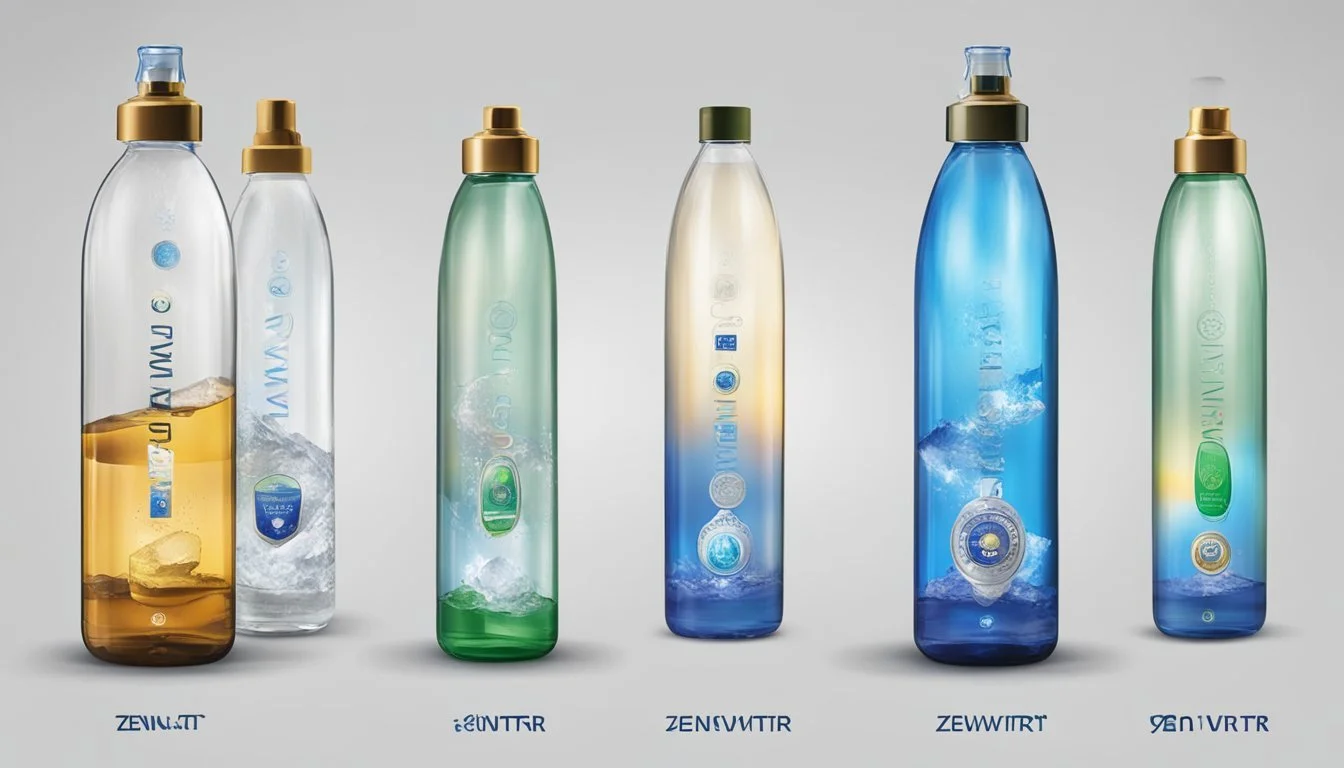Crystal Geyser vs. Zenwtr
Comparing Quality, Taste, and Value
When choosing between Crystal Geyser and ZenWTR, consumers are often torn between taste and environmental impact. Crystal Geyser is known for being relatively inexpensive and readily available. Frequently bottled at the source, it offers a consistent, if not particularly thrilling, taste.
ZenWTR, on the other hand, differentiates itself with its strong commitment to environmental sustainability. Leveraging recycled ocean-bound plastic for its bottles, ZenWTR aims to combat plastic pollution and reduce environmental impact. If sustainability is a top priority, ZenWTR stands out as the better option.
Both brands have their merits and it ultimately depends on what values the consumer places at the forefront. Whether it’s affordability and taste with Crystal Geyser, or ecological responsibility with ZenWTR, understanding these differences helps in making an informed choice.
Understanding Bottled Water
Choosing bottled water involves looking at its sources, purification processes, and environmental impact. These factors ensure the quality of water you consume and its sustainability.
Sources of Bottled Water
Bottled water can originate from various sources such as spring water, municipal water, or underground aquifers.
Spring water is collected from natural springs and often boasts a perceived purity due to its origin. Municipal water comes from public water systems, typically treated before bottling. Some brands use distilled water, which undergoes a process to remove minerals and impurities. Distinguishing these sources helps consumers make informed choices based on origin and treatment methods.
Purification Process and Quality
Bottled water undergoes different purification processes to ensure safety and taste.
Common methods include filtration, distillation, and reverse osmosis. Filtration removes impurities through physical barriers, chemical processes, or biological approaches. Distillation involves boiling water and condensing the steam back into liquid, eliminating contaminants and minerals. Reverse osmosis forces water through a membrane to filter out particles. Brands may also add minerals for taste or health benefits. Understanding these processes aids in selecting water that meets personal preferences and health requirements.
Environmental Impact of Bottled Water Production
Environmental sustainability is a growing concern in bottled water production.
Manufacturing and transporting bottled water have significant environmental footprints. Traditional bottled water often utilizes virgin plastic, contributing to plastic waste and pollution. Sustainable brands focus on reducing this impact by using recycled materials or offering biodegradable options. Beyond packaging, factors like carbon emissions from transportation need consideration. Consumers are encouraged to opt for environmentally-friendly brands to minimize their ecological footprint.
Comparative Analysis of Crystal Geyser and ZenWTR
Crystal Geyser and ZenWTR offer distinctly different bottled water experiences, focusing on affordability and sustainability, respectively. This comparison explores their brand histories, physical and chemical properties, and taste profiles.
Brand Histories and Philosophies
Crystal Geyser has been in the bottled water market since 1977. It prides itself on offering natural spring water at an affordable price. The water is bottled at the source with claims of maintaining purity and quality.
ZenWTR, on the other hand, is a more recent brand with a strong focus on sustainability. Launched in the early 2020s, ZenWTR boasts environmentally-friendly practices, using recycled plastic for its bottles and positioning itself as a premium product with health benefits.
Physical and Chemical Properties
Crystal Geyser’s water is sourced from natural springs and is not modified beyond purification. It doesn't highlight specific pH levels or electrolyte content, focusing on availability and price instead.
ZenWTR features a pH of 9.5, classifying it as alkaline water. This higher pH level is marketed to balance body acidity, which is appealing to health-conscious consumers. The brand also emphasizes the inclusion of electrolytes and minerals, aiming to enhance hydration and well-being.
Taste Profiles
Crystal Geyser offers a straightforward taste attributed to its natural spring origins. It is described as unremarkable yet not unpleasant, making it a reliable choice for everyday hydration without any sophisticated flavor.
ZenWTR’s taste reflects its alkaline and mineral-rich composition. Many users report a clean, smooth taste. The eco-friendly branding and health claims contribute to a feel-good factor for consumers who are inclined toward sustainable choices.
Health and Hydration
When comparing Crystal Geyser and ZenWTR, it's important to evaluate their effectiveness in hydration and their mineral and electrolyte content.
Hydration Efficiency
Crystal Geyser is a widely available spring water, known for its clean and refreshing taste. Typically, spring water like Crystal Geyser is effective in hydrating due to its pure, natural source.
ZenWTR boasts a pH of 9.5, making it an alkaline water. Advocates of alkaline water argue that it promotes better hydration and helps neutralize acidity in the body. This higher pH level may potentially improve the body's overall hydration efficiency.
Despite ZenWTR's claims, Crystal Geyser also provides effective hydration without the added alkalinity. Individual preferences for taste and pH can influence perceived hydration benefits, but both waters are suitable for maintaining hydration.
Presence of Minerals and Electrolytes
Crystal Geyser's mineral content is derived from its natural spring source. Typical minerals found in spring water include calcium, magnesium, and potassium. These minerals are beneficial for the body's electrolyte balance and overall mineral intake.
ZenWTR, on the other hand, also contains essential minerals and electrolytes due to its alkaline nature. The high pH level suggests that it might include increased amounts of minerals like calcium and magnesium.
Both Crystal Geyser and ZenWTR offer beneficial minerals, but ZenWTR's alkaline properties might provide an edge in terms of higher mineral content. Consumers may choose based on their dietary needs and preferences for mineral intake.
Consumer Considerations
In choosing between Crystal Geyser and ZenWTR, consumers typically evaluate factors such as price, availability, and packaging convenience. Each of these aspects plays a crucial role in determining the best option for their needs.
Price Comparison
Crystal Geyser tends to be more affordable compared to ZenWTR. On average, a 24-pack of Crystal Geyser can be purchased for around $4.99 to $5.99. In contrast, ZenWTR, which markets itself as a premium alkaline water brand, costs about $14.99 for a 12-pack of similar bottle sizes. This significant price difference can influence budget-conscious consumers towards choosing Crystal Geyser.
Prices can vary by state, but the trend remains consistent in areas like New York, Florida, and Texas. Budget-friendly Crystal Geyser appeals to a broader range of consumers due to its lower cost.
Availability Across States
Crystal Geyser has a widespread distribution network, making it available in most states, including Michigan, Pennsylvania, and others. Consumers find it easily accessible at major grocery chains, convenience stores, and even online platforms.
ZenWTR, while also available nationwide, tends to be stocked in specialty stores and premium supermarkets. In some regions, particularly rural areas, ZenWTR may not be as readily available as Crystal Geyser. This distribution variance can be a deciding factor for consumers prioritizing ease of purchase.
Packaging and Convenience
Crystal Geyser offers various packaging options from single bottles to large packs, catering to different consumption needs. Their bottles are made from PET plastic, which is recyclable, although not always from recycled materials. This standard packaging appeals to a wide range of consumers seeking practicality.
ZenWTR positions itself as a more eco-friendly brand, using bottles made from 100% recycled ocean-bound plastic. These environmentally conscious efforts attract consumers who prioritize sustainability. The sleek design of ZenWTR's bottles also adds a touch of sophistication, making it appealing for business or social settings.
Both brands ensure their packaging is easy to handle and store, but ZenWTR's commitment to using recycled materials sets it apart for environmentally minded consumers.
Analyzing Consumer Taste Preferences
When comparing Crystal Geyser and ZenWTR, taste is often a critical factor that influences consumer choices. Let's explore the specific flavor profiles and public perceptions of these two bottled water brands.
Flavor Profiles
Crystal Geyser is known for its clean, crisp taste. Many consumers describe it as having a refreshing quality, which makes it a popular choice among bottled water enthusiasts. On the other hand, some reviews mention a slightly metallic or mineral-like undertone, likely due to its source and mineral content.
ZenWTR boasts a smooth and mildly alkaline flavor, attributable to its higher pH level of 9.5. This alkalinity can lead to a more neutral and less acidic taste, which some users find more pleasant and less harsh compared to other brands. The smoothness is often appreciated by those who drink it regularly.
Public Perceptions and Reviews
Public reviews highlight Crystal Geyser as a reliable, everyday option, often available at a reasonable price point. The brand has a loyal customer base that values its consistent quality. However, some reviews raise concerns about its variable taste, depending on the bottle and batch.
ZenWTR receives high marks for its eco-conscious packaging and premium quality. Reviews often commend it for its commitment to sustainability and its pleasant, alkaline taste. Consumers who prefer alkaline water tend to rate ZenWTR highly, noting its smooth and refreshing profile. Critics, if any, usually point to its higher price compared to more conventional brands.
These reviews and consumer experiences are essential for drawing conclusions about which water might be the best fit for different preferences.
Regulatory and Quality Standards
When comparing Crystal Geyser and ZenWTR, a close look at their regulatory and quality standards reveals key differences in their approach to compliance and transparency.
Compliance with International Standards
Both Crystal Geyser and ZenWTR adhere to regulations set by the International Bottled Water Association (IBWA), which ensure the water’s safety and quality. These standards include guidelines on production, bottling, and storage processes.
Crystal Geyser adheres to these standards to meet the expectations of the IBWA. Similarly, ZenWTR maintains compliance with international standards, reflecting its commitment to high-quality production. Each brand must undergo rigorous testing for contaminants, ensuring the end product is safe for consumption.
Additionally, both brands must meet U.S. Food and Drug Administration (FDA) requirements. These regulations mandate strict controls over the sourcing and treatment of water, further enhancing consumer trust in these brands.
Transparency and Labeling
Transparency is crucial for consumer trust, and both brands prioritize clear labeling. Crystal Geyser provides detailed information about the water source and treatment methods on its labels. Moreover, they offer reports accessible online for consumers to verify water quality.
ZenWTR emphasizes its transparency by clearly displaying the pH level and other relevant details on its bottles. With a pH of 9.5, the alkaline nature of ZenWTR is highlighted for those looking for specific health benefits.
The Environmental Working Group (EWG) has praised transparency in labeling, as consumers’ access to information about bottled water’s source and contents is vital. Both companies' commitment to transparency helps ensure that consumers are well-informed about what they’re drinking.
Environmental and Sustainability Concerns
Sustainability and environmental impact play significant roles when choosing between bottled water brands. Understanding each brand's commitment to these issues is crucial for informed consumption.
Impact of Plastic Bottles
Plastic bottles contribute to pollution and equate to significant environmental harm. Crystal Geyser employs traditional plastic bottling methods, which can result in high levels of microplastics upon consumption. Studies highlight the presence of contaminants, illustrating the need for more significant steps towards sustainable practices.
ZenWTR, on the other hand, takes an advanced approach by utilizing 100% recycled plastic for their bottles. This method significantly reduces the waste footprint and provides a more sustainable option. Their initiative helps in mitigating the accumulation of single-use plastics in landfills and oceans.
Sustainability Efforts by Brands
Crystal Geyser has begun to address the need for sustainability but still lags behind in comprehensive practices compared to more innovative brands. The company focuses on sourcing water responsibly; however, the lack of robust recycling programs and the presence of microplastics still pose concerns.
ZenWTR prioritizes environmental sustainability by not only using recycled plastics but also contributing to ocean clean-up efforts. This dedication reflects the brand's broader commitment to sustainability. Their comprehensive approach ensures reduced environmental impact and sets a benchmark for other brands in the bottled water industry.
Both brands offer different levels of commitment towards sustainability, with ZenWTR exemplifying a more forward-thinking approach.
Final Comparison and Verdict
When comparing ZenWTR and Crystal Geyser, several factors stand out.
ZenWTR is known for its natural alkalinity with a pH of 9.5. This high pH level is achieved without artificial additives, making it a favorite for those seeking alkaline water. It also prides itself on sustainability, as the company uses recycled ocean-bound plastic for its bottles.
On the other hand, Crystal Geyser offers a straightforward, pure taste. This brand's water is sourced from natural springs, providing a reliable and refreshing flavor. It is a more typical bottled water with no added benefits like alkalinity or sustainable packaging.
Taste can be subjective, but ZenWTR often appeals to those who prefer alkaline water and appreciate environmental efforts. Crystal Geyser, meanwhile, is favored by those seeking a classic, crisp spring water experience.
Price-wise, ZenWTR tends to sit at a higher price point due to its alkalinity and eco-friendly packaging. Crystal Geyser is generally more budget-friendly, making it accessible for everyday use.
Packaging could be decisive for some. ZenWTR’s use of recycled materials highlights its commitment to reducing plastic waste. Crystal Geyser's traditional packaging reflects a straightforward approach without emphasizing environmental initiatives.
Table Comparing Key Features
Feature ZenWTR Crystal Geyser Source Alkaline springs Natural springs pH Level 9.5 Neutral Sustainability Recycled plastic Standard plastic Taste Alkaline, smooth Crisp, pure Price Mid to high Low to mid
Each brand has unique attributes catering to different preferences. ZenWTR aligns with health-conscious and eco-friendly consumers. Crystal Geyser provides a simple, reliable hydration option.
More About Crystal Geyser
Acqua Pana vs Crystal Geyser: Which Bottled Water is Better?
Alkaline88 vs Crystal Geyser: Which Bottled Water is Better?
Aqua Carpatica vs Crystal Geyser: Which Bottled Water is Better?
Boxed Water vs Crystal Geyser: Which Bottled Water is Better?
Cascade Mountain vs Crystal Geyser: Which Bottled Water is Better?
Castle Rock vs Crystal Geyser: Which Bottled Water is Better?
Core Hydration vs Crystal Geyser: Which Bottled Water is Better?
Crystal Geyser vs CBD Living: Which Bottled Water is Better?
Crystal Geyser vs Crystal Lake: Which Bottled Water is Better?
Crystal Geyser vs Essence pH10: Which Bottled Water is Better?
Crystal Geyser vs Kirkland Signature: Which Bottled Water is Better?
Crystal Geyser vs Open Water: Which Bottled Water is Better?
Crystal Geyser vs Proud Source: Which Bottled Water is Better?
Crystal Geyser vs Richard's Rainwater: Which Bottled Water is Better?
Crystal Geyser vs Simple Truth: Which Bottled Water is Better?
Crystal Geyser vs Talking Rain AQA: Which Bottled Water is Better?
Crystal Geyser vs Weird Water: Which Bottled Water is Better?
Crystal Geyser vs Whole Foods 365: Which Bottled Water is Better?
Hawaii Volcanic vs Crystal Geyser: Which Bottled Water is Better?
Hawaiian Springs vs Crystal Geyser: Which Bottled Water is Better?
Ice Mountain vs Crystal Geyser: Which Bottled Water is Better?
Icelandic Glacial vs Crystal Geyser: Which Bottled Water is Better?
Just Water vs Crystal Geyser: Which Bottled Water is Better?
Liquid Death vs Crystal Geyser: Which Bottled Water is Better?
Mountain Valley Spring Water vs Crystal Geyser: Which Bottled Water is Better?
Nestle Pure Life vs Crystal Geyser: Which Bottled Water is Better?
Poland Spring vs Crystal Geyser: Which Bottled Water is Better?
Purely Sedona vs Crystal Geyser: Which Bottled Water is Better?
San Pellegrino vs Crystal Geyser: Which Bottled Water is Better?
Smartwater vs Crystal Geyser: Which Bottled Water is Better?
Solan de Cabras vs Crystal Geyser: Which Bottled Water is Better?
Topo Chico vs Crystal Geyser: Which Bottled Water is Better?
Whole Foods Italian Still Mineral water vs Crystal Geyser: Which Bottled Water is Better?
Zephyrhills vs Crystal Geyser: Which Bottled Water is Better?

